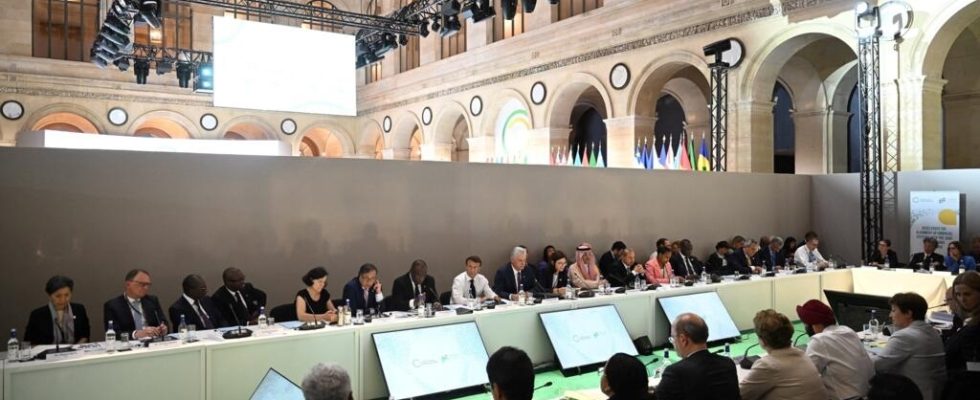Leaders from the North and the South pleaded Thursday in Paris to release the trillions of dollars essential for the energy transition and the adaptation of countries vulnerable to global warming, a problem closely linked to development.
French President Emmanuel Macronhost of this summit for a new financial pact, scheduled until Friday, called for a ” public funding shock in the face of the climate crisis and poverty. Mia Mottley, Prime Minister of Barbados, received plaudits after demanding a “ absolute transformation of the financial system, and not only a reform “. ” It is the future of Humanity that is being discussed here “, judged the managing director of the International Monetary Fund (IMF), Kristalina Georgieva.
On the civil society side, we are still waiting for action. For example, Julie-Anne Richards, head of strategy for the Lost and Damage collaboration, was not yet satisfied despite some interventions that she considered positive. ” We need a complete transformation and for the moment what we hear is a strengthening of the status quo, the strengthening of the loans. So more debts for developing countries that don’t have the means to repay. Instead of a loan system, we need subsidies “, she explains.
Read alsoNorth-South: is a new financial pact possible?
” How dare you ? »
And around twenty African leaders also responded, several of whom raised their voices and carried the same message against the rich countries that are quicker to pay billions to support Ukraine at war. Kenyan President William Ruto opened his remarks by renaming this Summit “ How dare you ? “. A message for Westerners at the origin of a financial system ” who trapped the poor countries he said, calling for global taxation.
” The IMF has proposed a carbon tax. We want a global tax on financial transactions that even we African countries will pay. Let’s agree on a tax on aviation, maritime transport… It is only by raising global funding that corresponds to the interest of the world that we will manage to face this planetary challenge. “, did he declare. And, among the ideas retained in the discussions, that of an international tax on carbon emissions from maritime transport has the wind in its sails. Emmanuel Macron reiterated that she was “ very important “.
Senegal
The complexities of energy transition in Africa were illustrated by Senegal. For the country, President Macky Sall announced that a group of rich countries and development banks have pledged to mobilize 2.5 billion euros to help Senegal reduce its dependence on fossil fuels. ” THE Senegal is committed to increasing to 40% renewable energies by 2030 (…) with funding of around 2.5 billion euros “, declared the Senegalese president, announcing this “ partnership for a fair energy transition » (JETP) established with France, Germany, the United Kingdom, Canada and the European Union.
Currently, Senegal is at 31% of renewable energies on the basis of a debt which is made under not always favorable conditions “, explained Macky Sall. And to add: We believe that if this money is mobilized we will be able to reach or even exceed the objective » by 40%. Other similar partnerships had already been signed with South Africa, Indonesia and Vietnam.
Read alsoRémy Rioux (DG AFD): a new global financial pact for the energy transition
African debts
The world leaders also mentioned avenues for institutional reform, a strengthening of the role of the private sector and the restructuring of the debts of poor countries. The Chadian president did not mince his words on the debt of the countries of the continent and called “ to the pure and simple cancellation of the debt of African countries ” in order to “ compensate for the enormous damage caused by climate change and alleviate the burden suffered by African countries in spite of themselves “.
For its part, Zambia has succeeded in forging an agreement to restructure its debt. The announcement was made during the first day of the summit for a new global financial pact. But rescheduling 6.3 billion and a half dollars of Zambian debt when two-thirds is held by China was not easy for the other bilateral creditors of the Paris Club. According to the Elysée, the presence of the Chinese Prime Minister in Paris facilitated the conclusion of the negotiations.
This agreement was reached with the “common framework” for debt rescheduling. This is a group of creditors of African countries launched two and a half years ago at the G20 in Riyadh: it includes China, today the largest creditor of African countries.
Two other African countries are in the running to obtain a treatment of their debt within this common framework of the G20: Ethiopia and Ghana. After Chad, Zambia therefore becomes the second country to obtain a restructuring of its debt within the common framework of the G20, a framework created two and a half years ago to involve China in negotiations between creditors.
